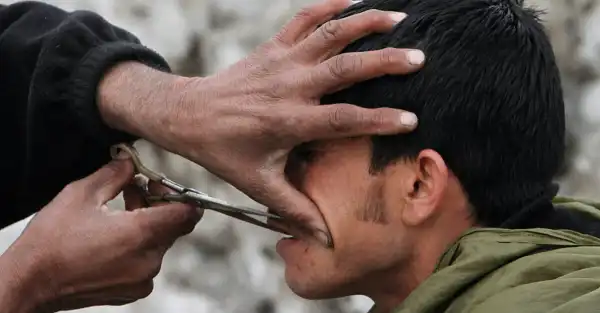
A UN report says Taliban morality police have detained men and their barbers for inappropriate hairstyles and others for skipping prayers at mosques during Ramadan.
This happened six months after laws were introduced to regulate the conduct of citizens in the country.
Last August, the Ministry of Vice and Virtue unveiled laws affecting many aspects of daily life in Afghanistan, including the use of public transport, music, shaving and holidays.
In particular, the ministry banned women from performing and appearing with uncovered faces in public places.
That same month, a senior UN official warned that the laws painted a “bleak picture” for the country's future by increasing existing restrictions on employment, education and clothing for women and girls.
Taliban officials have dismissed UN concerns about moral laws.
A report by the UN mission in Afghanistan found that in the first six months of the laws being in place, more than half of the arrests involved “either men with inappropriate beard or hair lengths or barbers providing inappropriate beard or hair cuts.”
The report also said morality police often arbitrarily detained people “without due process or legal protection.”
It was also reported that during the holy month of Ramadan, control over men's attendance at obligatory congregational prayers was very strict, sometimes leading to arbitrary detentions of those who did not attend.
The UN mission noted that the negative impacts have affected both sexes, especially small business owners such as private schools, hairdressers, tailors, catering companies and restaurants, resulting in reduced or complete loss of income and jobs.
The report stresses that the direct and indirect socio-economic impacts of these laws are likely to worsen the already difficult economic situation in Afghanistan.
A World Bank study has found that barring women from education and employment could cost the country more than $1.4 billion (£1 billion) each year.
Taliban leader Hibatullah Akhundzada reaffirmed the supremacy of Islamic law and the role of the Ministry of Vice and Virtue in transforming Afghan society and its people.
In a message posted ahead of the religious holiday of Eid al-Fitr, which marks the end of Ramadan, Akhundzada said it was necessary to “create a society free from corruption and trials and not allow future generations to fall prey to erroneous beliefs, harmful practices and bad morals.”
According to the report, more than 3,300 inspectors, mostly men, are tasked with informing citizens about the laws and ensuring they are followed.
No one from the Ministry of Vice and Virtue was available to comment on this report.
Sourse: breakingnews.ie






